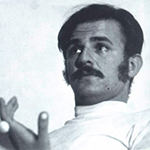May the Girls Forgive Rafael Salcedo
I’m both a woman and a man Forced to fold
from a gentle virility A femininity
made tough from art takes over my heart
Still I’ve always loved a friend more
I’ve had women I adore right next to me
I gave Tania my heart on the stage
And we spoke
on the Bogotá streets and under the Cali night
My bones rattled before the clearness
in Margarita Bermúdez’s honey-colored grape eyes
My poems in Beatriz Castaño’s voice and music
are the feeling of a heart like mine
But a friend is a friend and I hope the girls can forgive him
They don’t put up with all my boozing like Rafael Salcedo
Like my sweetheart Rafa Salcedo Castañeda
Harmonious in a soul masculinity
like the vast cool breeze of the Universe
They don’t put up with so much mooching like
good old Rafa friend for life
Ciénaga’s celebrated Beautiful tragic
like a bird caught in the storm
The Prince of the Sinú Valley
His feelings lighter than heron wings
and still as strong as their flight His virility
a proud masculine prince arrogant dreamer Carries
himself like he can’t help but love Inherits
the land Mythical zebus white and reddish
A carriage of wood and dark violet metal
Like his eyes Where he keeps the Damascus night
His voice thunder watered down by the whisper of a breeze
Elegant like a desert horse His ways
vestiges of Eastern ancestors smoking
hashish The blackest eyelashes flicker the air
purple depths under ancestral addict eyes
He lies down on a pistachio-green silk cushion
Feeds on almonds Olives Rice
Raw meat with onion and wheat Unleavened bread
Raisins Sesame Coconut Tart yogurt
His colors black Blue and magenta
His elements air and land His spirit
like a young peasant god pushing away the harsh winter
To grant his strength to the countryside’s weak His intimate
essence the endless boy within
the poet’s illusion and his mad wanting to reach him
in his full short-lived journey towards manhood
well-known to unhappy habits
His sense uncontested an arrow a heart pounding
from the sorrow of erotic bliss His pleasure a full spilling
of the self over my dreams forsaken in his hands
His forever in me like a long-desired love
at the heart of every moment Of every poem
Lola Jattin
Beyond the night twinkling in childhood
Beyond even my first memory
Is Lola –my mother– in front of a wardrobe
powdering her face and fixing her hair
She’s already gone thirty years beautiful and strong
and she’s in love with Joaquín Pablo –my old man–
She doesn’t know I’m hiding in her womb for whenever
the strength of her own life needs mine
Beyond these tears running down my face
her immense sorrow like a stab wound
is Lola –dead– still vibrant living
sitting on a balcony to watch the stars
when the swamp breeze messes up
her hair and she once again combs it
with some sort of concerted laziness pleasure
Beyond this instant gone by not coming back
I’m hidden in the flow of time
that takes me far away and now I just know
Beyond this poem killing me in secret
is old age –death– everlasting time
when both memories: my mother’s and mine
are just a lonesome memory: this verse
translators’ note:
Raúl Gómez Jattin (Cartagena, 1945–1997) was one of Colombia’s most outstanding—and controversial—literary figures. Admittedly, his work is not easily summed up in a typical biographical or introductory note. He hasn’t won any major literary awards, virtually all of his contemporaries shun his work, and the few critics who have recognized him haven’t been able to neatly locate his poetics within established generations or movements. Simply put: Gómez Jattin wrote in a way no Colombian poet has ever written before. His writing deviates from his country’s tradition, which has largely been characterized by its conservatism and academic rigidity. It, instead, centers on “taboo” or “obscene” themes that rarely appear in verse: drug use, mental illnesses, homelessness, the expression of unauthorized sexualities, and, for the first time in the Colombian tradition, an openly queer poetic subject.
While such topics can be easily sensationalized, what we find here is a deep dialogue with literary traditions, in and beyond the poet’s region. In this way, Gómez Jattin’s work not only challenges the heteronormative, but also all manifestations of the normative more broadly conceived. As a queer man of Syrian descent with no formal education in poetry, writing in a way that challenged long-established beliefs about what poetry should be and what poets should look like, he was viewed as a threat to the sanctity of Colombian verse, and his rightful place at the forefront of his country’s tradition has long been denied.
These translations are from our in-progress bilingual manuscript of his work, Almost Obscene: Poems.

Katherine M. Hedeen is a specialist in Latin American poetry and has both written extensively on and translated contemporary authors from the region. Her latest translations include In the Drying Shed of Souls: Poetry from Cuba’s Generation Zero (The Operating System) and Prepoems in PostSpanish (Eulalia Books), a chapbook by Ecuadorian neo-avant-garde poet Jorgenrique Adoum. She is an Associate Editor for Action Books, the Poetry in Translation Editor for the Kenyon Review and a two-time recipient of a NEA Translation Project Grant. She resides in Ohio where she is Professor of Spanish and Literary Translation at Kenyon College.

Olivia Lott’s translations of Colombian poetry have most recently appeared in Brooklyn Rail In Translation, The Kenyon Review, MAKE, Río Grande Review, Spoon River Poetry Review, Waxwing, and World Literature Today. She is the co-translator of Soleida Ríos’s The Dirty Text (Kenning Editions, 2018) and the translator of Lucía Estrada’s Katabasis (Eulalia Books, 2020). She is a Ph.D. Student and Olin Fellow in Hispanic Studies at Washington University in St. Louis, where she is writing a dissertation on translation, revolution, and Latin American neo-avant-garde poetics.

Raúl Gómez Jattin (Cartagena, 1945–1997) was one of Colombia’s most outstanding poets and the author of seven books of poetry. He spent most of his adult life between psychiatric hospitals and the streets. As a queer man of Syrian descent writing in a way that broke with his country’s tradition, his rightful place at the forefront of Colombian poetry has long been denied. In 1997, he was tragically killed by a bus.

 BACK TO ISSUE
BACK TO ISSUE